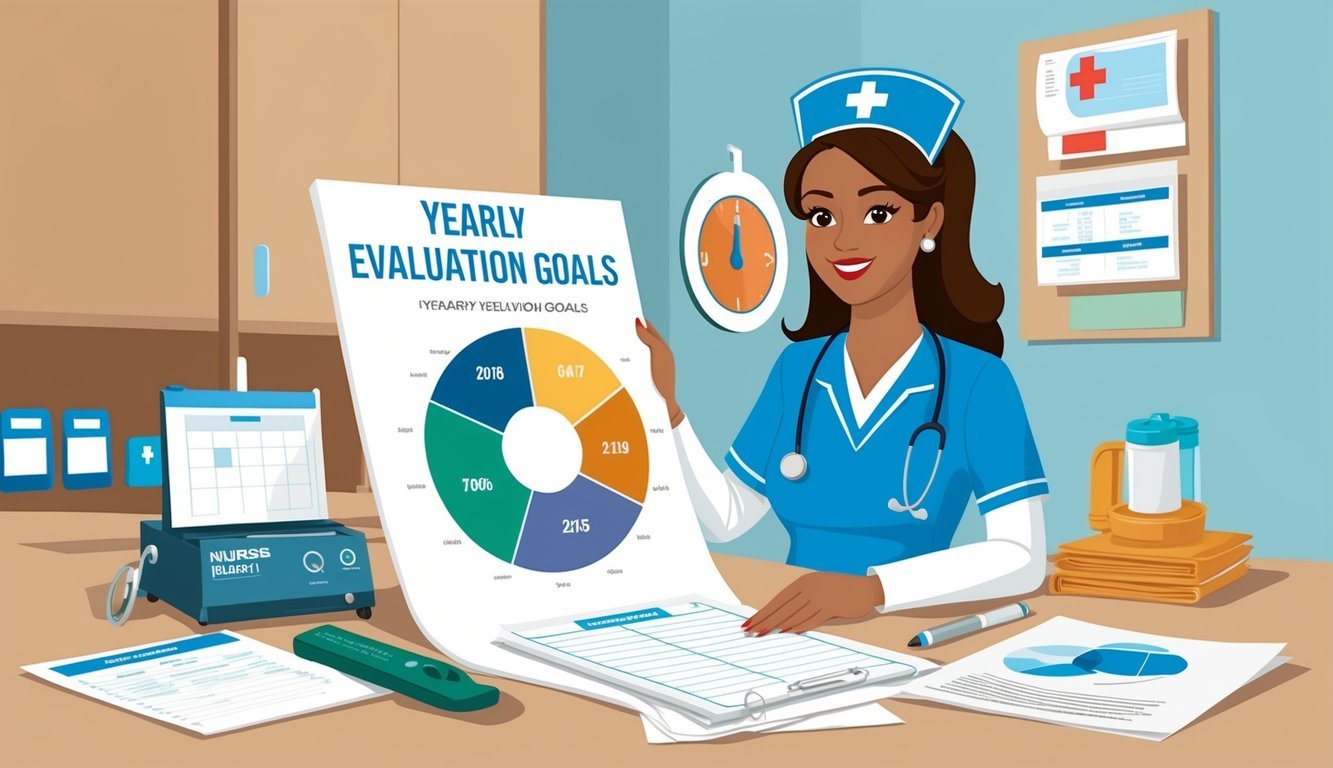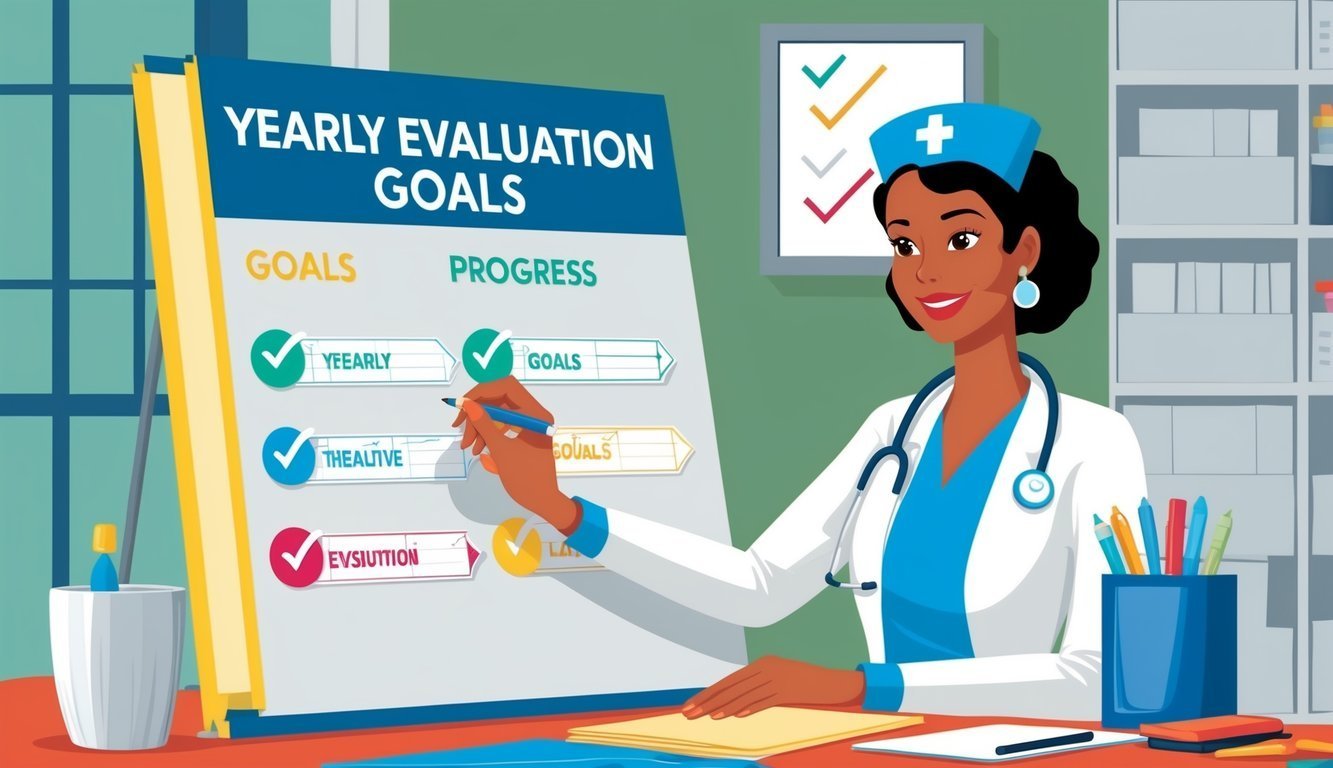Setting clear nursing goals is essential for professional growth in the nursing field. These goals not only help you improve patient care but also support your overall development as a nurse.
As you progress in your career, it’s important to reflect on what you want to achieve each year to enhance your skills and meet the demands of the profession.
In this article, you will find practical examples of nursing goals that can guide your yearly evaluations.
From enhancing your clinical skills to improving patient communication, these goals cover a range of areas vital to delivering high-quality care.
Whether you are a new nurse or an experienced professional, establishing measurable and attainable goals can lead to greater accountability and a more fulfilling career.
By incorporating these examples into your evaluation process, you can track your progress and ensure you remain focused on your professional development.
This structured approach will not only benefit your patients but also enhance your role within the nursing profession.
Key Takeaways
- Clear nursing goals drive both patient care and your professional growth.
- Measurable objectives ensure accountability in your nursing practice.
- Regular evaluations help refine your skills and advance your career.
Understanding Nursing Goals

Setting clear nursing goals is vital for your professional growth.
These goals guide you in enhancing your skills and career trajectory.
Using the SMART criteria ensures that your objectives are structured effectively.
Defining SMART Goals
SMART is an acronym that stands for Specific, Measurable, Attainable, Relevant, and Time-bound.
Each component ensures your goals are clear and achievable.
- Specific: Define exactly what you want to achieve. For example, instead of saying “I want to improve my skills,” state “I want to complete a course in diabetic patient care.”
- Measurable: Establish how you will measure your success. This could be passing an exam or gaining patient feedback.
- Attainable: Ensure the goal is realistic. Set goals that challenge you but are possible given your resources.
- Relevant: Align your goals with your overall nursing career pathway. Choose areas that enhance your capabilities.
- Time-bound: Set a deadline for achieving your goals, such as completing a certification within six months.
For additional guidance on crafting SMART goals, visit FreshRN.
Importance of Career Goals in Nursing
Career goals are essential for your development in nursing.
They help you focus on what you want to achieve and how to navigate your career path.
Setting clear objectives can lead to various benefits:
- Direction: Goals provide a roadmap for your career. They help you prioritize tasks and make informed decisions.
- Motivation: Achieving your goals boosts your confidence and drive. It encourages continuous improvement, keeping your commitment strong.
- Skill Development: Goals often require you to learn new skills or deepen your knowledge. This directly benefits your patients and professional reputation.
By establishing clear nursing goals, you enhance your practice and career advancement.
For more insights on professional nursing goals, check out Incredible Health.
Setting Patient Care Objectives
Creating clear objectives for patient care is essential for enhancing the quality of health services.
Focus on specific, measurable goals that will improve outcomes and ensure safety, education, and clinical proficiency in the nursing field.
Prioritizing Patient Safety
Your primary goal should always be patient safety.
This includes assessing risks and taking steps to minimize them.
You can achieve this by:
- Implementing safety protocols: Adhere to best practices such as hand hygiene and fall prevention.
- Regularly updating skills: Attend workshops on the latest safety techniques.
- Monitoring patients closely: Observe for any abnormal signs and respond quickly.
Tracking incidents or near misses can help you identify areas for improvement.
Enhancing Patient Education
Patient education is crucial in ensuring that patients understand their health conditions and treatments.
Key strategies include:
- Developing tailored educational materials: Create handouts that are relevant to your specific patient group.
- Offering one-on-one sessions: Use these to address questions and concerns effectively.
- Creating teach-back methods: Ask patients to explain what they learned to ensure comprehension.
This approach empowers patients and improves adherence to their care plans.
Resources like Patient Education Materials can help you develop effective strategies.
Improving Clinical Skills
Improving your clinical skills should be an ongoing objective.
This not only enhances your confidence but also benefits patient care.
Consider these actionable steps:
- Set specific goals: Identify which skills need improvement, such as IV placement or wound care.
- Engage in simulation training: This allows for practice in a controlled environment.
- Seek mentorship: Work with experienced nurses to gain insights and tips.
Regular self-assessment, along with feedback from peers, will assist you in measuring progress and setting realistic goals for your development.
Exploring SMART Goals for Nurses can provide a structured approach to skill enhancement.
Professional Development and Competency
Focusing on professional development and competency is essential for advancing your nursing career.
Key areas include continuing education, advancing through the clinical ladder, and enhancing your leadership and management skills.
These components will help you grow as a nurse and improve patient care.
Continuing Education and Certification
Continuing education is vital in nursing.
It ensures you stay updated with the latest practices, technology, and treatments.
Many states require a certain number of continuing education units (CEUs) for license renewal.
Consider obtaining specialized certifications in areas such as critical care, pediatrics, or geriatrics.
These certifications enhance your skills and make you more marketable.
They also demonstrate your commitment to personal and professional growth.
You can find various resources for continuing education through organizations like the American Nurses Association or Coursera for online courses.
Advancing Clinical Ladder
The clinical ladder allows you to progress in your nursing career without necessarily moving into management.
It involves achieving higher levels of competency by meeting specific benchmarks in patient care and professional development.
Each step on the ladder typically requires completing more advanced training or gaining additional experience.
For example, you might start as a staff nurse and aim to become a clinical nurse specialist.
Advancing on the clinical ladder not only increases your earning potential but also enhances your skills in direct patient care.
This progression can lead to greater job satisfaction and opportunities for mentorship.
Leadership and Management Skills
Leadership is an essential aspect of nursing that impacts patient care and staff dynamics.
Improving your leadership skills can prepare you for roles such as nurse manager or supervisor.
Consider setting specific SMART goals to enhance your leadership abilities, such as attending management workshops or leading a project.
These goals can help you develop crucial skills in teamwork, communication, and conflict resolution.
Participating in leadership roles also positions you to advocate for your team and improve workplace culture.
Strong leadership fosters a positive environment, leading to better patient outcomes and staff retention.
Achieving Quality and Efficiency in Nursing
In nursing, focusing on quality and efficiency is vital for improving patient care and optimizing workflow.
By implementing quality improvement projects and utilizing effective time management strategies, you can enhance both your practice and the overall healthcare experience.
Implementing Quality Improvement Projects
Quality improvement (QI) projects help enhance patient safety and care quality.
You can start by identifying areas that require improvement within your nursing unit.
Common QI goals might include reducing medication errors, decreasing hospital-acquired infections, or enhancing patient education.
Consider forming a QI team that includes various nursing roles for diverse perspectives.
Collect data to measure baseline performance, then set clear, measurable objectives.
For instance, a project might aim to reduce catheter-associated infections by 30% over six months.
Regularly review progress and adjust measures as needed to ensure the project is effective.
Boosting Efficiency Through Time Management
Effective time management is essential for boosting efficiency in nursing.
Prioritizing tasks can help you focus on what is most important and reduce unnecessary delays.
Here are some strategies:
- Use a Daily Checklist: List your responsibilities each day. This helps in tracking which tasks are completed and what still needs attention.
- Delegate When Possible: Empower your team by assigning tasks that can be handled by others.
- Limit Distractions: Identify and minimize interruptions during high-focus tasks to improve your concentration.
Additionally, consider scheduling specific blocks of time for different activities.
This structure can lead to better patient outcomes and a positive work environment.
Evaluation and Accountability
Performance reviews in nursing require a clear framework for evaluation and holding staff accountable.
This ensures that nursing goals are met and that there is consistency in assessment skills and documentation.
Effective Nursing Evaluations
Effective nursing evaluations are essential for assessing your performance and identifying areas for improvement.
These evaluations should assess various competencies, including clinical skills, communication, and teamwork.
To enhance accuracy, consider the following:
- Regular performance reviews to track progress toward goals.
- 360-degree feedback from peers, managers, and patients for a well-rounded view.
- Documentation of achievements and challenges faced throughout the year.
Establishing a structured evaluation process helps ensure you remain accountable for your professional development.
Accurate assessments provide insights into your strengths and areas needing improvement, leading to better patient care.
Setting Accountability Standards
Accountability in nursing means taking responsibility for your actions and meeting set standards.
Establishing clear accountability expectations is vital for your professional growth.
Consider implementing these standards:
- SMART Goals: Ensure your objectives are Specific, Measurable, Achievable, Relevant, and Time-bound. This clarity helps you stay focused.
- Regular Check-ins: Schedule consistent meetings with supervisors to discuss progress and roadblocks.
- Self-Assessment: Regularly evaluate your performance to identify personal strengths and limitations.
By setting these accountability standards, you foster a culture of responsibility within your team.
This contributes to improved patient outcomes and makes the evaluation process more transparent.
For more tips on SMART goals in nursing, visit FreshRN.
Frequently Asked Questions

In this section, you will find answers to common questions about nursing goals and evaluations.
This includes professional development, effective performance reflection, and strategies for setting appropriate objectives.
What are common professional goals that nurses set for their yearly evaluations?
Nurses often set goals that enhance their skills and patient care.
Common goals include improving patient communication, increasing medication administration accuracy, and participating in continuing education.
These objectives help track progress and ensure high standards in nursing practice.
Can you provide examples of long-term nursing goals for career development?
Long-term goals may involve advancing your education or specialization.
Examples include obtaining a Master’s degree in nursing or becoming certified in a specific area, like critical care or pediatrics.
These steps can lead to roles in management or advanced practice.
What are appropriate objectives to include in a nursing yearly evaluation?
When setting objectives, consider measurable outcomes like reducing patient wait times or increasing patient satisfaction scores.
You might also aim to complete specific training sessions or improve teamwork through collaboration with other healthcare professionals.
How can a nurse effectively reflect on their performance in a yearly review?
Effective reflection involves reviewing achievements and identifying areas for growth.
You can use feedback from peers and supervisors to assess your performance.
Keeping a journal of your experiences and learning can also be beneficial for deeper insights.
What are key performance indicators used in nursing performance appraisals?
Key performance indicators (KPIs) can include patient care metrics, compliance with protocols, and participation in training.
Other important KPIs may look at patient outcomes, such as readmission rates and patient satisfaction surveys.
These indicators help assess your effectiveness and areas for improvement.
How should a nurse set SMART goals for professional growth in an annual evaluation?
SMART goals should be Specific, Measurable, Achievable, Relevant, and Time-bound.
For example, instead of saying you want to “improve communication,” set a goal like “participate in a communication workshop within the next six months and apply techniques in daily interactions.” This method clarifies your objectives and tracks progress effectively.

